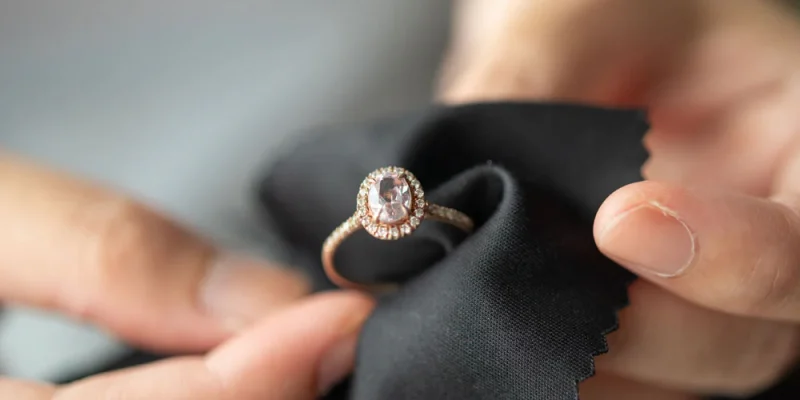Jewellery has sentimental value to most people. If you own a collection of fine jewellery, a family heirloom or a few pieces it’s important to maintain them so that their value and beauty last a long time.
Care for jewellery can be difficult, especially if it is made from different materials. You must take care when cleaning, handling and storing jewels. Your jewellery will not lose its value and charm if you take care of it.
Daily wear can cause damage to your jewelry, such as tarnish and dullness. You may also lose prongs. You can avoid these problems by being careful when handling and cleaning jewellery.
This article explores the best practices in jewellery care including cleaning techniques and storage tips.
Jewellery Wearing Guidelines
Different materials will react differently with everyday wear. Sterling silver jewellery, for example, is more likely to be scratched due to its softness. It also oxidizes more quickly than other metals such as gold or platinum, and is more likely to lose its shine.
You can extend the life of your jewellery by following a few simple rules.
After applying skincare and makeup, put on jewellery last.
All cosmetics such as hairsprays, perfumes and lotions contain chemicals which can react badly with jewellery.
The chemicals in perfumes and lotions can permanently damage porous stones like pearls.
Applying jewellery after you have applied them and letting them air dry for a few minutes will limit exposure and potential damage.
Wear jewellery only when you are doing housework or physical exercise
Sweating, using certain equipment and hard blows while playing sports can cause jewellery to bend or scratch.
Remove all jewelry before you exercise to ensure your comfort and safety. You can be injured if your jewellery gets caught in clothing or equipment.
Metals can corrode or tarnish over time due to sweat and moisture in steam rooms.
Chlorinated waters react with precious metals such as silver and platinum. You should not wear your expensive jewels while doing household chores, as most of the water you use in your home contains chlorine.
Wearing jewellery is not allowed in the showers, swimming pools and spas
Chlorine in spas and pools is more intense, causing color changes and structural damage.
Always remove your jewellery before you enter chlorinated water.
Some metals react with water and cause surface damage.
- Shower water can damage sterling silver jewelry, particularly if the jewellery is not dried properly afterward. The water may cause tarnishing or discoloration that is difficult to remove.
- Shower water can also affect gold-plated jewellery, particularly if it is thin or worn. The water can cause gold to flake or fade, exposing the metal underneath.
It is generally recommended that you remove your jewelry. If you cannot do this and your jewellery is solid gold, then it is fine.
It is important to dry your jewellery properly after you have removed all moisture and debris. These can cause it to become soiled and lose its shine.
If the setting is loose, you will have to worry about losing stones. The water can make them fall down and drag them into the drain.
Remember to always avoid wearing precious jewelry if you will be exposed to 3S: Swim, Sweat, Steam.
Cleaning Jewellery Rules
It is important to have a dedicated cleaning kit for your jewelry (a soft cloth and a brush). This will prevent damage to your jewellery by using materials which could be too harsh, or contaminated with harmful chemicals.
- Before storing your jewellery, you will need to clean it with a soft, lint free cloth.
- Soft toothbrushes are ideal for intricate pieces that have lots of detail
If you see that your jewels have lost their shine or accumulated dirt which is difficult to remove, soak them for a few minutes in warm, clean water. Never use hot or boiling water. Then, gently brush them using a soft-bristled toothbrush.
How do you clean gold jewellery
The tarnishing of gold jewellery, particularly a necklace, can be caused by exposure to air and moisture as well as oils on your skin. You can clean gold jewellery with a solution of water and a few drops mild dish soap or shampoo.
Then gently scrub the jewels with a clean, soft makeup brush or soft-bristled toothbrush.
Do not forget to thoroughly rinse your jewellery under running water, to remove soap residue. Pat dry with a soft towel. Paper towels and tissues can scratch the gold. Use a lint free cloth to clean and dry your gold jewelry.
How do you clean sterling silver jewelry?
Silver jewellery can be cleaned with a mild solution of soap and warm water. Contrary to popular opinion, you should not use toothpaste. It is too abrasive to be used on silver jewellery.
How to clean gemstones and diamonds jewellery?
When cleaning jewelry that contains gemstones or diamonds, you should be extra cautious. If the stones are small, scrubbing too hard may cause them to fall out.
A great tip is to never clean jewellery in the sink. This goes for the tiny pieces as well. You could wash the jewellery down the drain if you use water and a few drops soap.
It can happen, even if it seems obvious or you don’t think it will. Avoid losing your jewelry by using a bowl to soak it for a while.
Ultrasonic cleaning
Ultrasonic cleaners work by using high-frequency soundwaves that travel through cleaning liquids, creating pressure and heat that removes dirt from jewellery. This technology can be a great way to remove dirt from hard-to reach places, but it is best left in the hands professionals.
It is not a good idea to clean jewelry at home with an ultrasonic cleaning device you bought online. It isn’t a one-size-fits-all solution, just like many home remedies. Some stones are treated to improve their appearance. Ultrasonic cleaning may harm the stone.
The ultrasonic waves can also damage organic gems such as emeralds and pearls. They are especially destructive if they are coated with wax or oil.
Ask your jeweller how to clean jewellery in advance and listen to their advice.
How do you store jewelry?
Cleaning your jewelry is the first step to storing it. This will remove all dirt and oils that may have built up over time and damage the metal and stone if left to sit. Imagine washing your face before going to bed and wearing clean clothing.
Next, let’s move on to storing.
Jewellery boxes or pouches provide the safest and most secure way to store fine jewellery. Jewellery should, as a rule, be kept away from sunlight, heat and humidity.
Diamonds are the hardest materials on the Mohs Scale, so separate them properly to prevent scratching and tangling, especially with gold necklaces.
You can also use plastic zip-lock bags that are airtight and made from Mylar or Polyethene, which are ideal for storing your items away over a long period of time. They allow you to remove both air and moisture.
The bags used to line trash cans, such as polyvinyl plastic bags, contain compounds of sulfur that accelerate the tarnishing of silver. Rubber containers can also be a bad choice for the same reasons.
Avoid storing your jewelry on a jewellery tree in the bathroom. The excessive heat and humidity will damage its appearance.
Avoid leaving the gems in the sun for a long time as this could negatively affect them. Pearls can bleach when exposed to extreme heat, and amber will darken with time.
Tips on how to take care of jewellery
Jewellery is not just a way to add style to your outfit, it also reflects your personality. If you want to maintain the beauty of your jewellery, whether it’s a family heirloom piece or a fashionable piece that you purchased on a random whim, it’s important to take care of it.
The right care can not only prolong the life of your device but also prevent any damage or loss.
Keep your jewelry in good condition with these helpful tips.
1. Keep wood away from your jewelry
It is beautiful, natural and can be used for many types of furniture and decor. However, it will damage your jewelry. Wood, particularly unfinished wood or wood that has not been treated, can release acids and other chemicals which can corrode and discolour metals and gems.
Keep your jewelry away from wooden surfaces, such as dresser tops or jewellery boxes.
2. Insure your jewellery
It is always wise to insure your jewellery against damage or loss. This can give you peace of mind if your jewellery has sentimental or monetary value.
3. Separate gold and silver jewellery
Keep gold and silver jewellery apart. Gold is a soft material and can be easily scratched when it comes into contact with other metals that are harder, like silver.
You can prevent scratches and damage to your gold jewelry by storing it separately. Separating your precious metal jewellery also helps to prevent tarnishing and discoloration. Certain metals react with one another over time.
Also, you may be interested in reading The Differences between Gold and Platinum
4. Regular cleanings should be done with mild cleaners
Your jewellery will retain its shine and beauty if you regularly clean it with a lint free cloth. It is best to use gentle cleaners in order to prevent any damage to your valuable possessions.
Abrasive or harsh chemicals can scratch delicate surfaces. To clean your jewellery, we recommend using a gentle brush, mild soap and warm water.
Your precious jewels will last longer and look better with proper care
Take care of your jewelry to keep it sparkling and beautiful. This will also ensure its longevity. Keep your jewellery away from harsh chemicals, environments and store it properly. Clean it with mild solutions regularly.













Comments